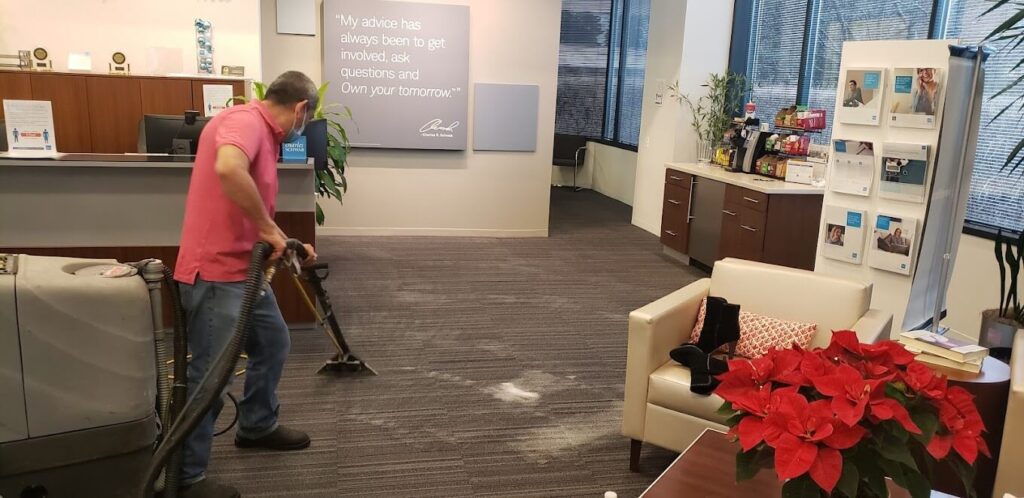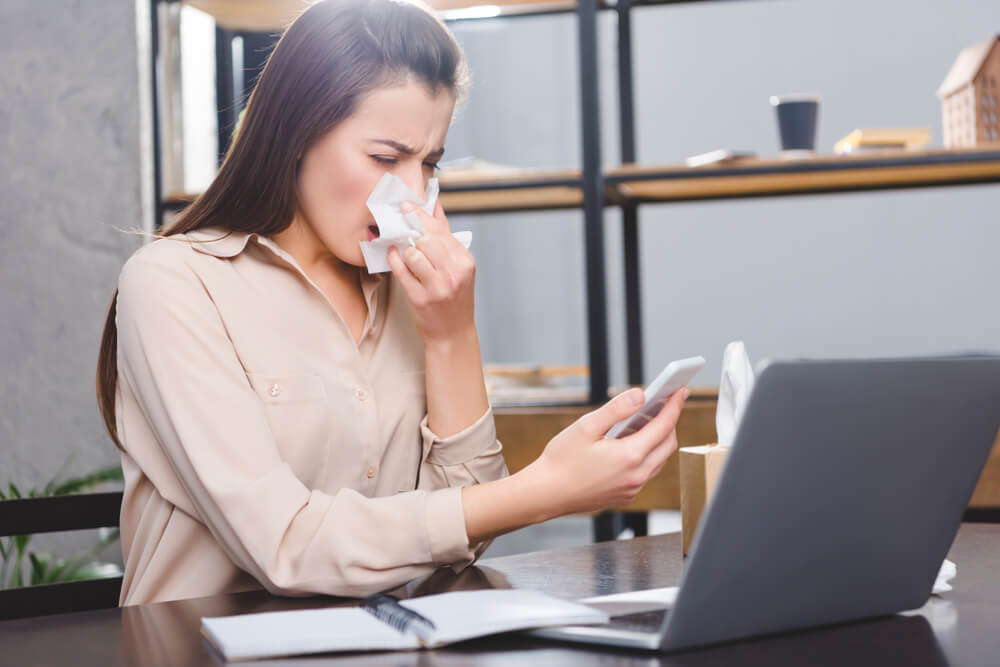In today’s fast-paced work environment, maintaining a clean and healthy workplace is more important than ever. With many employees spending a significant portion of their day indoors, the quality of the air they breathe can significantly impact their productivity and overall well-being.
One of the primary concerns for many offices is allergens. From dust and pollen to mold spores, these tiny particles can cause significant discomfort for employees, leading to reduced productivity and increased sick days.
This is where professional cleaning services come into play. Let’s dive into how these services can help control allergens in workplaces and create a healthier environment for everyone.
Why Allergens Matter in the Workplace
Before we discuss how professional cleaning services help control allergens, let’s briefly explore why allergens are a concern in the workplace. Allergens are substances that can cause allergic reactions in sensitive individuals. Common workplace allergens include:
- Dust mites: These tiny creatures thrive in office environments, particularly in carpets and upholstery.
- Pollen: Especially problematic during certain seasons, pollen can easily make its way indoors.
- Mold: Mold spores can flourish in damp areas, like bathrooms and kitchens, and can be harmful to health.
- Pet dander: If employees bring pets to work or if there are animals nearby, dander can trigger allergies.
The presence of these allergens can lead to symptoms such as sneezing, coughing, headaches, and fatigue. In some cases, prolonged exposure can worsen conditions like asthma. Thus, keeping allergens in check is crucial for employee health and productivity.
How Professional Cleaning Services Make a Difference
Professional cleaning services are equipped with the right tools, techniques, and expertise to significantly reduce allergens in the workplace. Here’s how they do it:
1. Comprehensive Dusting and Vacuuming
Effective dusting and vacuuming are foundational steps in allergen control. Professional cleaners use high-efficiency particulate air (HEPA) filter vacuums that can trap tiny particles, including dust mites, mold spores, and pet dander. This is crucial because traditional vacuums may simply blow dust back into the air.
- Dusting: High dusting techniques ensure that even the hard-to-reach areas, such as ceiling fans, light fixtures, and shelves, are cleaned. By removing dust from these surfaces, professional cleaners help prevent it from settling and becoming airborne.
- Vacuuming: Regular vacuuming with HEPA filters captures allergens and keeps carpets and upholstery cleaner. Frequent cleaning schedules also ensure that dust and allergens don’t accumulate over time.
2. Specialized Carpet and Upholstery Cleaning
Carpets and upholstered furniture can be significant reservoirs for allergens. Professional cleaning services often use deep-cleaning methods such as hot water extraction (steam cleaning) to eliminate dust mites and other particles trapped within these surfaces.
- Deep Cleaning: This method involves injecting hot water and cleaning solutions into carpets and upholstery, followed by powerful extraction. This not only removes allergens but also sanitizes surfaces, making them inhospitable for allergen producers like dust mites and mold.
- Regular Maintenance: Professional cleaning services can schedule regular carpet cleaning sessions to keep allergens at bay, especially in high-traffic areas.

3. Effective Air Quality Management
The air quality in an office is a significant contributor to allergen levels. Professional cleaners can help improve indoor air quality through various methods:
- Air Duct Cleaning: Over time, dust and allergens can accumulate in HVAC systems. Professional cleaning services often offer air duct cleaning, which helps remove these particles, reducing the amount of allergens circulating in the air.
- Use of Air Purifiers: While cleaning services focus on physical surfaces, incorporating air purifiers into the workplace can further enhance air quality. These devices capture airborne allergens and help maintain a cleaner environment.
4. Sanitization and Disinfection
While cleaning removes allergens, sanitization and disinfection play crucial roles in allergen control as well. Professional cleaning services use hospital-grade disinfectants to eliminate bacteria and viruses that can exacerbate allergic reactions.
- Surface Sanitization: Regular sanitization of frequently-touched surfaces—like doorknobs, light switches, and shared equipment—reduces the risk of allergens and pathogens causing illness.
- Mold Prevention: In areas prone to dampness, such as restrooms and kitchens, professional cleaners apply specialized treatments to prevent mold growth, keeping mold spores from becoming an issue.
5. Eco-Friendly Cleaning Products
Many professional cleaning services have shifted towards using eco-friendly cleaning products. These products are often less harsh on indoor air quality and reduce the likelihood of allergic reactions.
- Non-Toxic Cleaners: By opting for non-toxic, biodegradable cleaning agents, professional services minimize the introduction of additional allergens and irritants into the workplace.
- Allergen-Free Solutions: Some cleaning products are specifically designed to be hypoallergenic, further helping to reduce the presence of substances that could trigger allergic reactions.
6. Tailored Cleaning Plans
Every workplace is unique, with different allergens present based on the environment, the number of employees, and other factors. Professional cleaning services can create tailored cleaning plans that cater to the specific needs of an office.
- Customized Schedules: Depending on the level of allergen exposure, a cleaning service can schedule more frequent cleanings for high-risk areas, like break rooms and restrooms, or provide special attention during allergy seasons.
- Targeted Strategies: By assessing the types of allergens present, professional cleaners can implement targeted strategies to address specific concerns, such as extra deep cleaning of carpets during peak pollen seasons.
7. Employee Training and Awareness
Professional cleaning services can also offer training and support for employees, educating them on how to maintain a clean workspace and reduce allergens.
- Best Practices: Training can include guidelines on reducing clutter, keeping personal workspaces tidy, and maintaining cleanliness in shared spaces.
- Awareness Campaigns: By raising awareness of allergen control, companies can empower employees to take an active role in maintaining a healthier workplace.
Conclusion
Controlling allergens in the workplace is not just about cleaning—it’s about creating a healthy, productive environment for employees. Professional cleaning services play a vital role in this process by using advanced techniques and equipment to reduce allergens effectively.
With comprehensive dusting, specialized carpet cleaning, air quality management, and tailored cleaning plans, these services help ensure that workplaces remain free from harmful allergens.
Investing in professional cleaning not only supports employee health but also boosts productivity and morale. So, if you haven’t already, consider partnering with a professional cleaning service to keep your workplace clean, fresh, and allergen-free.
FAQs
1. How often should professional cleaning services be scheduled to control allergens?
Typically, it’s recommended to schedule professional cleanings at least once a month, with more frequent cleanings for high-traffic areas or during allergy seasons.
2. Can I use regular cleaning products to manage allergens effectively?
While regular cleaning products can help, professional cleaning services often use specialized, hypoallergenic products that are more effective at controlling allergens.
3. What are some common allergens found in workplaces?
Common allergens include dust mites, mold spores, pollen, pet dander, and even certain cleaning chemicals.
4. Are there specific cleaning techniques that are better for allergen control?
Yes, techniques like steam cleaning carpets, using HEPA-filter vacuums, and sanitizing surfaces can significantly reduce allergens in the workplace.
5. How can employees help reduce allergens in the office?
Employees can help by keeping their workspaces tidy, promptly cleaning up spills, and reporting areas that require professional cleaning attention.

